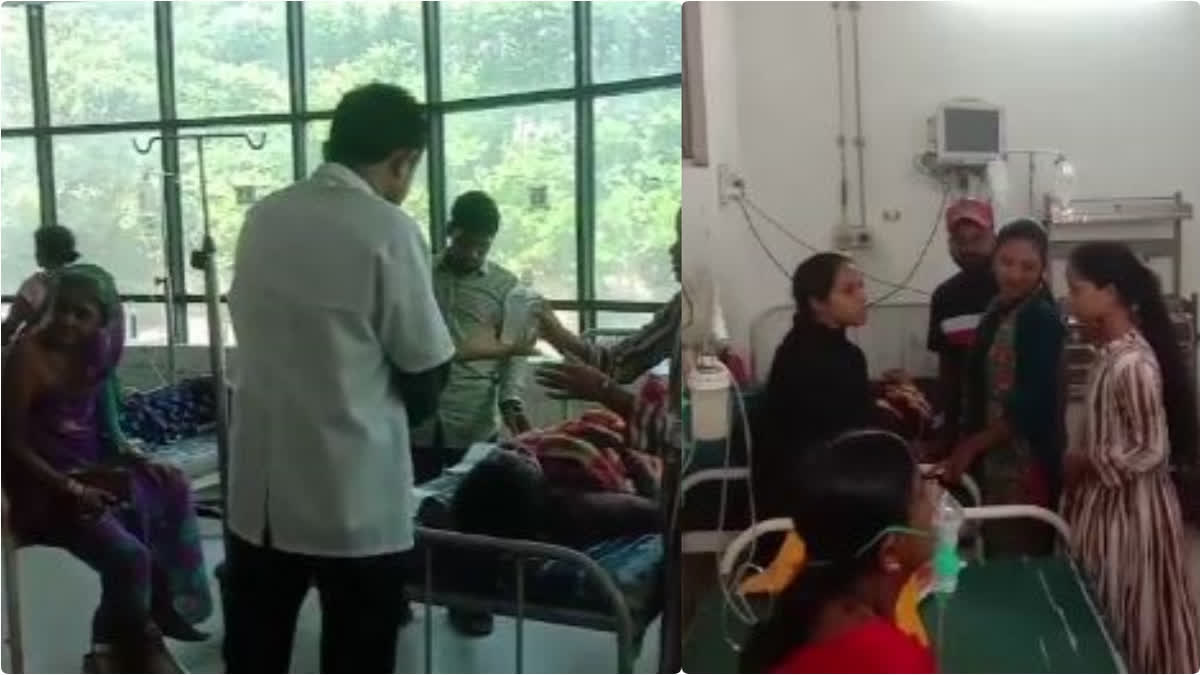KANDHAMAL: Two women lost their lives and six others remain critically ill allegedly due to food poisoning in Mandipanka village, located in the Daringbadi block of Kandhamal district in Odisha. The victims reportedly fell sick after consuming a homemade paste made from mango kernels, known locally as 'takua'.
Both the deceased and those who are sick began feeling unwell shortly after eating the mango kernel paste. The family members and villagers immediately rushed all the eight affected people to the Brahmanigaon Health Center for treatment. However, due to the severity of their condition, six patients were later shifted to MKCG Medical College and Hospital (MCH) in Berhampur. Tragically, while one woman succumbed at the Brahmanigaon center, the other died en route to Berhampur. Another patient has also been shifted to the ICU after her condition worsened.
The six remaining patients are receiving treatment at MKCG MCH. Dr. Pradeep Padhi, Associate Professor, Medicine, and the treating physician, stated that all six are in critical condition and food poisoning is suspected as the likely cause. “Eating mango kernel gruel is common among the tribal communities here. However, improper preparation can lead to toxicity. All the affected had consumed the kernel three days back and suffered diarrhoea symptoms. Only when their situation worsened and two of them succumbed, they were rushed here," Dr. Das added, further noting that the specific cause of poisoning in this case is still under investigation.
The Integrated Disease Surveillance Project (IDSP) officials, Mobile Health Unit and local medical teams are keeping a watch on the situation. Whether it is food poisoning or diarrhoea, we will get the confirmation after the team submits a report, said Director Health Dr. Bijay Mohapatra.
Mango kernels, often dried and ground to make gruel or paste, are sometimes used as a last-resort food source in rural areas during scarcity. While generally safe when processed correctly, poorly prepared kernels can produce toxins that may lead to severe health issues.
Subodh Majhi, husband of one of Tuni Majhi who is undergoing treatment at the hospital, said the community had stopped consuming the mango kernel gruel since long. "But we all consumed the gruel four days back while some leftover was kept stored. On Wednesday some women in the nearby house took out the stale gruel and consumed it leading to health problems," he stated.
"We are used to having mango kernel and we could not resist the temptation," added Majhi. Locals have reported similar cases of illness related to mango kernel consumption in the past, pointing to the need for awareness on safe preparation methods.
Under the State Food Security Scheme (SFSS), the government provides 5 kg of rice per person per month to eligible households. This program was extended for five years on December 16, 2023. Additionally, the Pradhan Mantri Garib Kalyan Anna Yojana (PMGKAY) offers 5 kg of free food grains per month to low-income families. Under the Antyodaya Anna Yojana (AAY), households identified as the “poorest of the poor” receive 35 kg of food grains per household per month. According to the National Food Security Act (NFSA), families covered by the Public Distribution System (PDS) receive subsidized rations at rates of Rs 2-3 per kg.
However refuting allegations that the villagers were deprived of rice under PDS and that led them to consume the kernel, Minister of Food Supplies, Consumer Welfare Minister Krushna Chandra Patra said, e-KYC work is on and will take around 15 days more to be completed. "The e-KYC is mandatory for the beneficiaries," he added.
Officials from the Kandhamal district administration have reached out to the affected families and are investigating the incident. Local health authorities are also urging residents to exercise caution when preparing mango kernel dishes and have promised to increase awareness efforts in vulnerable areas.
This incident follows a similar tragedy in Kashipur block of Rayagada district, where a 12-year-old child and an elderly man from Sipijodi village died after allegedly consuming mango kernel in 2016. Ten others were hospitalized with symptoms of diarrhoea. Kashipur made headlines also in 2001 when around 24 people died after eating mango kernel gruel. Starvation allegations in the area also led to a government inquiry in 1997, bringing attention to the dire food shortages faced by the community.



